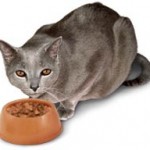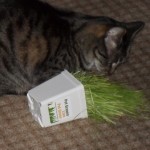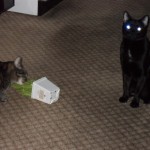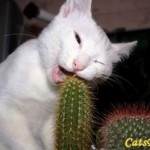Cat Diet & Nutrition
 I’ve seen lots of information about cat and kitten diet and nutrition. Unlike dogs, cats nutrition needs are much different because of their natural prey.
I’ve seen lots of information about cat and kitten diet and nutrition. Unlike dogs, cats nutrition needs are much different because of their natural prey.
Cats are obligate carnivores. Their diets should consist mostly of meat protien like poultry, beef, rabbit, venison and fish. Other diet boosters are eggs and cottage cheese.
Veterinarians have varying advice. Some recommend raw food only or canned and dry kibble food. Some people think homemade food is better. And still others think cats need herbs and supplements.
Dry kibble is processed and contains starch and protein mixed. The outcome is not enough protein in the dry kibble to satisfy a cat’s protein needs. Kittens require twice as much protein as puppies. Even grain-free kibble contains too much starch. If you prefer dry kibble, look for a high protein-to-carbohydrate ratio. Many vets recommend supplementing with canned cat food. By the way, always have fresh water available with kibble because it is very low in moisture content. Supplement with cottage cheese, scrambled eggs and lightly cooked meat.
There are many homemade recipes that are just too high in grains, cereals or vegetables, which displace the essential protiens a cat needs. Most cat fanciers discourage using homemade recipes.
Raw food is missing many cat and kitten nutritional requirements. If you give your pet raw food, it must be fresh as possible. Never leave it out longer than 10 or 15 minutes. You should include supplements to make up for missing essential vitamins and minerals, such as taurine. For example, taurine is absolutely necessary and it’s found in rodents, such as mice. Since rodents are not part of your pet’s diet, your pet needs a supplement for this missing amino acid. Also, kittens often cannot handle a homemade raw diet and may develop digestive problems. Keep in mind, even if your cat is not ill, it can shed salmonella in its feces for up to a week.
 I’ve often seen my cats eating grass in the yard. Bad news because you will probably be introducing parasite eggs into your pet’s body by allowing them to eat lawn grass. Instead, I either grow or purchase cat-friendly grasses. Wheat grass by Pet Greens Live Pet Grass (Green Nutrition) is one of my cat’s favorite grasses. (Moolah takes over the container!) I give it to them periodically through the year, especially during spring when they are shedding their coat. My cats consider grass a treat.
I’ve often seen my cats eating grass in the yard. Bad news because you will probably be introducing parasite eggs into your pet’s body by allowing them to eat lawn grass. Instead, I either grow or purchase cat-friendly grasses. Wheat grass by Pet Greens Live Pet Grass (Green Nutrition) is one of my cat’s favorite grasses. (Moolah takes over the container!) I give it to them periodically through the year, especially during spring when they are shedding their coat. My cats consider grass a treat.
Have you had trouble with your cats and kittens raiding your indoor plants? This is often because they are not getting enough water or moisture in their diet.
Some people give their cats herbs in a holistic approach. This practice is dangerous because cats have trouble digesting some herbs. For instance, meadowsweet contains salicylic acids, which causes trouble breathing, kidney failure and possibly death. Do your research before offering your cat herbs. Herbs for Pets: The natural way to enhance your pet’s life, by Mary Wulff-Tilford and Greg Tilford (2009, Bow Tie Press) is recommended by Cat Fancy magazine, along with these research web sites: http://www.herbalgram.org/, http://www.herbs.org/, http://www.vbma.org/, and http://www.nasc.cc/.
 There are quite a few sources used in the development of this article:
There are quite a few sources used in the development of this article:
Cat Fancy, “Natural Cat” Department by Lisa Hanks, pg 21, May 2011 issue
Kittens USA, “Guide to the Well-Fed Kitten,” by Janiss Garza, pg 56, 2012 Annual edition
Santa Barbara Independent, “Is my cat eating correctly?,” by Dr. David Edward Brooks, Feb 2007, http://tiny.cc/qdkp7







